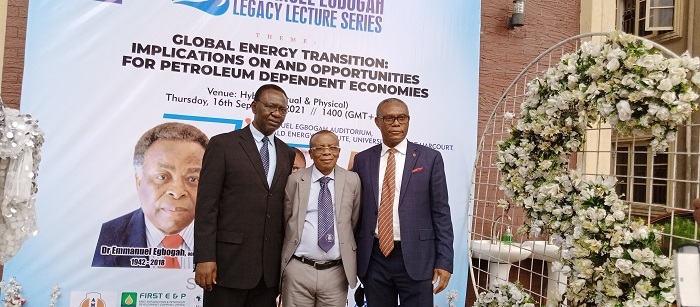L-R: Professors Wumi Iledare, Michael Onyekonwu and Joseph Ajeinka
-By Felix Douglas
Energy transition has been a focal issue across the globe following the call to end emission and embrace cleaner energy. This is coming after the Paris Treaty on climate change Agreement was signed in 2015.
Thus, there has been insinuations for renewable energy so that fossil fuel will be discarded and put an end to combustion hence the use of electric cars. It has been argued if electrification and the use of powered technology is the way to go across the globe.
Nonetheless, operators and experts in the oil and gas industry are of the opinion that fossil fuel is still relevant and its usefulness cannot be undermined especially in oil dependent economies.
This was a topical issue at the 10th Emmanuel Egbogah Legacy Lecture Series which was held at Emerald Energy Institute auditorium, University of Port Harcourt, Rivers State, south south, Nigeria. The theme of the Legacy Lecture was: “Global Energy Transition: Implications on and Opportunities for Petroleum Dependent Economies.” It was attended by the Deputy Vice chancellor Research and Development representing the Vice chancellor of UNIPORT, former Vice Chancellor and current Emmanuel Egbogah Chair in Engineering, UNIPORT, Professor Joseph Ajienka, Ghana National Petroleum Company (GNPC) Chair of Petroleum Economics and Management, Cape Coast University and Executive Director of EEF, Professor Wumi Iledare, Professor Michael Onyekonwu, Managing Consultant for Laser Engineering, Dr. Emeka Egbogah and Chairman of EEF, Acting Director of EEI, Dr. Chijioke Nwaozuzu among other dignitaries in the industry and academia.
Renowned energy expert and Managing Partner, Energy Outlook Advisors, Dr. Anas Alhajji gave the Keynote Address emphasizing that impact of climate change policies on oil demand are highly exaggerated. “The impact is mostly on demand growth, not on demand itself. African countries can reduce their carbon footprint by focusing on energy efficiency and the low hanging fruits, save oil and gas for exports or value added industries and place solar and wind projects strategically.”
He stated that there is need for all energy sources, while technology is an enabler with limitations. Also, it is easy to separate oil from water, but impossible to expunge it from politics.
He made an illustration that some dreams become reality, so global oil demand will continue to grow and dependence by industry and emerging economies on fossil fuel remains relevant. Even though Western powers like USA and UK are promoting the use of electric cars.
Alhajji spoke on carbon neutrality and how it can be reduced that only small part of carbon neutrality policies have been mitigated. “Mitigation is the larger part. Most carbon neutrality actions are gimmick and accounting games. How companies are reducing their Carbon footprints, play the game, control the policies, focus on low hanging fruits, after the low hanging fruit, it is all an accounting game.”
He explained on consumption of fossil fuel and forecasting issues that lessons have been learnt from historical trends in energy consumption and technology adoption. Technology is widely adopted and gives freedom in movement and time of use supported by market sources without government direct subsidies to buyers and the benefits are enormous.
Shortly after Alhajji keynote address, the President, Strategic Energy & Economic Research, Michael Lynch, revealed that oil and transport work together in the energy mix.
More so, greener cars are not visible as consumers are not embracing it compared to the likes of SUVs and other bigger vehicles.
According to Lynch, efficiency could cut oil use by 52% in 2025, “Enabled by a new industrial cluster focusing on lightweight materials, such as carbon-fiber composites. Recent advances in biotechnology and cellulose-to-ethanol conversion can double previous techniques yield, yet cost less in both capital and energy.” This will meet 25% of oil demand.
Lynch disclosed that even though the world is no longer in the era of Stone Age but stone is still a big business as it is used for various works in life. Thus, oil discovery caused a setback to coal as it was abandoned in Nigeria. However, it is advantageous to China since the South East Asian country is still using coal to generate electricity hence fossil fuel will continue to remain relevant across the globe not minding the aggressive campaign for transition to renewable energy. Many industry operators have alluded to this fact.
Speaking on Climate Change, he said, policy change might reduce demand for oil since consumers and companies intend to reduce emission.
Adding his voice to global energy transition, Executive Director, Institute of Geopolitics of Energy & Strategic Resources, Paul Michael Wihbey, believed that oil is still relevant and natural gas still plays vital role in energy consumption.
At present, across the globe, there is no perfect replacement for hydro carbon which is believed to enhance energy for the next 50 years adding value.
Giving his perspective in a virtual panel session, Lead Promoter, Energy Hub and former Managing Director of Energia, Dr. Felix Amieyeofori, submitted that fossil fuel is still in demand while heavy industries will be relevant to the market as renewables cannot run the global economy especially third world countries. There is pressure in the global economy to transit to renewables.
He advised the continent to work together in unison to actualize desired objectives and Nigeria can produce 2.4 million barrels per day since fossil fuel contribute significantly to its economy.
Dr. Ameiyeofori made it known that African has 40% share of the global economy and the continent maybe deprived. The world depends 60% on oil and gas despite its crave for energy transition.
Therefore, energy transition has its implications with inherent opportunities for oil dependent economies as fossil fuel apropos role in Africa cannot not be undermined in the next five decades.


Comment here